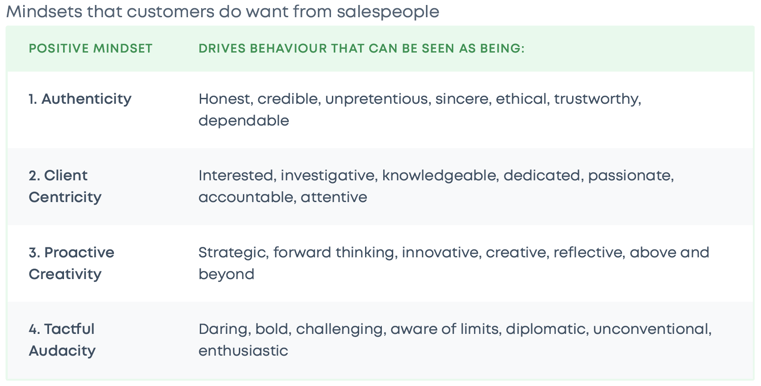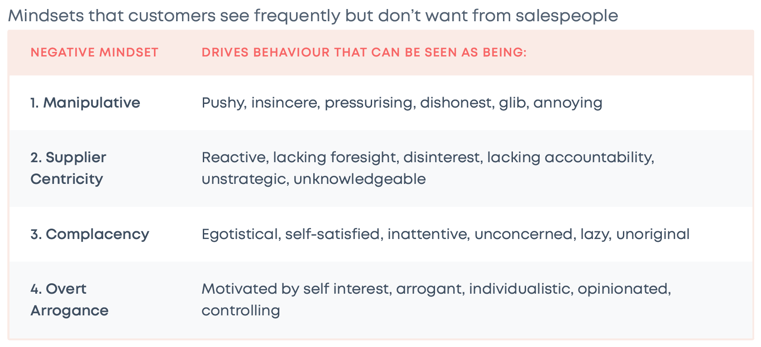Values, Not Competencies, Are The Key To Sales Transformation

By Dr Philip Squire, Founder & CEO, Consalia
Long before I had the idea for a values-led approach to sales, I asked a senior leader at a global pharmaceutical company a simple question: “What percentage of salespeople that you deal with meet your expectations?”
I had been interviewing him, as part of my research for my doctorate, about the qualities he looked for in a salesperson, and we had finished the discussion when I thought of this final question. His answer shocked me: “90% of salespeople are, in my view, a complete waste of time.”
I was so struck by this that I started incorporating the question into every interview I did. Time and again, senior-level executives from a range of industries including banks, telecoms, and retail kept bringing up that same figure: 90% of salespeople don’t sell in the way customers want to be sold to. Only 10% “get it”.
So why? Sales leaders, training providers and consulting firms had all been working for decades to develop salespeople’s skills with new and exciting methodologies. Companies had remuneration systems to incentivise good performance. New customer relationship management technologies were supposed to be improving processes and efficiency. Why were salespeople still being held in such low regard?
I continued to interview clients and to consider the answer to this issue until several years later, when I attended a presentation by Professor Jean McNiff. She began by saying: “To get a clear idea of what action research is, is to be clear about your 'values’”. This prompted me not only to engage in a close examination of my own values, but also to re-examine my findings from the interviews under a new lens.
Customers had been explaining to me the behaviours they did and didn’t want to see in salespeople, which had previously led me to believe the problem was one of competencies. With the right training, surely salespeople could be taught to display the behaviours customers wanted to see? Now I began to see things differently: if a salesperson truly had the right values engrained in them, the competencies and behaviours would follow naturally.
For example, a desired behaviour for a salesperson might be to understand the customer’s business. Someone who has just been told to do this might do some surface-level research and consider that box ticked. A salesperson with a truly held value of customer-centricity, on the other hand, would dig deeper into the needs of their customer not just because they were told to, but because they are genuinely curious and keen to understand how they could generate value for them.
I began to research which values would lead to the kinds of behaviours customers did and didn’t want to see. In the end, I distilled these down into eight “Mindsets”, four negative and four positive.


IS IT POSSIBLE FOR A SALESPERSON TO CHANGE THEIR VALUES AND MINDSET?
Absolutely. Our values are not set in stone, and with continuous critical reflection, we can shift away from the negative mindsets and towards the positive ones, bringing us closer to that 10% of salespeople who meet customers’ expectations. I call this “The Winners Circle”.
Of course, there are plenty of barriers to implementing a values-based approach to sales. Cultures that encourage the negative mindsets can be deeply ingrained within organisations, with short-term targets incentivising quick sales over generating long-term value. There can even be resistance from customers, as procurement departments can sometimes discourage out-of-the-box thinking in an attempt to have all vendors compete at the same, easily comparable, level.
There is also a tendency among some salespeople to consider all talk of values as woolly or lacking in substance. I would say this stems from a failure to really examine one’s values on an individual or company-wide level. How many businesses have you come across, or even worked in, who announced that something like “customer-centricity” was a key value for the organisation, wrote it up in a flashy PowerPoint deck and announced it at an all-hands meeting? How many of them then filed that slide deck away, and went straight back to being the same process-driven, supplier-centric organisation they always were? It’s no wonder that many salespeople see no point in thinking about their own values when they are set such a poor example.
My research into values-led selling went on to form the basis of my doctorate, which I later expanded into a book, Selling Transformed. Though the world has undergone dramatic shifts since I first conducted the research, I continue to have same kinds of conversations with customers, who are still looking for the same values in salespeople and are still saying only 10% of salespeople sell in the way they want.
In order to achieve true sales transformation in both performance levels and the perception of sales as a profession, organisations must shift away from adopting the latest shiny methodology that comes along every few years and look instead towards instilling a more fundamental change in their salespeople. We don’t just need to transform how we sell, but how we think about selling. This is our goal here at Consalia, and it all aligns with our vision to help make sales the world’s most sought-after profession.
 Dr Philip Squire, Founder & CEO, Consalia
Dr Philip Squire, Founder & CEO, Consalia
To find out more about Consalia’s values-led selling and the Sales Mindsets, please visit www.consalia.com.
You can find more information about Philip’s book, Selling Transformed, at www.consalia.com/selling-transformed-book.
This article was originally published in Engage Magazine. Download your copy here.


